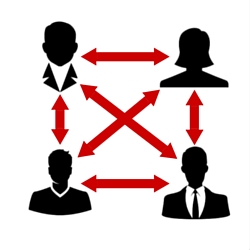 If tools and techniques are everywhere and consistently applied, why is it that most projects fail to deliver promises within time, budget, and scope?
If tools and techniques are everywhere and consistently applied, why is it that most projects fail to deliver promises within time, budget, and scope?
Ask any project manager what roadblocks typically impede project progress and nearly every response will state “People!” Pressing the issue, they will likely add, “Because they always resist the changes that my project requires” (Campbell, 2009).
Per Daniel Goleman in “What Makes a Leader,” from Harvard Business Review, 2004,
“Emotional intelligence is the critical distinction between great (project managers) leaders and people that have risen in the hierarchy based on their position.”
We function based on four advisers, and the communication between advisers forms the basis for emotional intelligence.
The four advisers are:
- Instinctual (brain stem)
- Emotional or heart (limbic system)
- Thinking or rational (neocortex)
- Intuitive (The brain structure for this adviser has not been successfully located yet)
Our four advisers interact by informing each other; they may overshadow, dominate or team up depending upon the situation.
Instinctual Adviser
- Represented by our reptilian or primitive brain, the oldest part of our brain
- Identifies physical threat and symbolic threat to self-esteem or dignity
- Readies you for a good fight or quick flight based on any perceived threat or danger
- Driven by self-preservation and physical needs
- Reacts to fear and anger
Emotional Adviser*
- Attaches meaning to events based on experiences and learning
- Emotions are in control when we’re in an unconscious state
- It’s reactive; your emotional response
Rational Adviser
- Thinks and plays an executive role in using logic and rational thought
- It weighs the costs and benefits and considers alternatives
- While helping us decide action, the result isn’t always what we feel like doing
Intuitive Adviser
- Makes quick decisions, judges character, make first impressions
- Allows “first instincts” or snap judgments
- Source for empathy or sharing another’s state of mind
- Sees the future; reads people
*Caution: Shame and guilt are often at the root of many personal difficulties and can have a devastating impact on our lives.
Guilt involves how your behavior has or will harm others in the future. Consider guilt as violating your own standards or values; whereas, shame is about violating someone else’s standards. It’s essential that we get clear about differences between our own standards and someone else’s in transforming shame. This requires possibly updating, revising, or redefining our standards.
Shame will usually conjure up such feelings as rejection in saying the wrong thing or “putting your foot” in your mouth.”
Achieve balance with all four of your brain’s advisers
- When your brain goes out of balance, you are favoring one adviser over another, leading to atrophy of less-used advisers
- Be alert to your intellectual adviser dominating the others
- Learn how to use your entire brain, which enables you to make wise choices
- Typically, as people get older, they limit their choices with narrower likes and dislikes, which prevents balancing the brain
Our four advisers interact by informing each other. One adviser might overshadow or dominate the others depending upon the situation. Two advisers, such as instinct and emotions, might team up, making it impossible to hear the advisers of logic and intuition; they become muted.
Successful project managers build rapport, influence stakeholders, collaborate, negotiate, and get things done through relationships by using all four advisers. The better PM’s are at developing and sustaining relationships, by using those advisers, the more successful we can expect to bring in projects on time, on target, and on budget.
